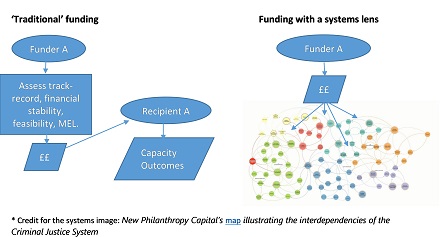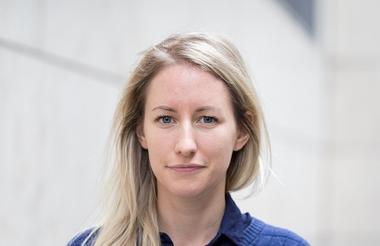Especially in times of economic upheaval, there is understandably some suspicion of the encouragement of enterprise. Trading by charitable organisations has often been framed as a silver bullet that can compensate for there being less money around. Regardless of whether there’s any merit in that argument, it can feel disconnected from the hardships experienced by real people.
So, before I start, this article isn’t that.
Instead, this piece makes the case that consideration of enterprise and trading – whether you support it directly or not – must exist in grant-makers application of systems thinking. Specifically supporting their ambitions to:
- Fund the ‘field’: Shifting from supporting the capacity of individual charities to address specific issues, towards supporting the capacity of a ‘field’ of interdependent actors within a system.
- Fund more equitably: Removing barriers which prevent funding equality and taking action to remedy this (credit to City Bridge Trust for this definition).
Funding with a systems lens
Applying a systems lens to funding acknowledges that social issues are influenced by complex interactions between macro factors (such as welfare policy) and micro (such as the relationship between two individuals).
The different approaches might be conceptualised as follows:

A good systems approach would not just involve one funder but would instead see coordination and collaboration between funders. It would also consider how power is distributed. Though overly simplistic, the graphic shows that funding with a systems lens seeks to support the capacity of a field of actors within a system and recognises that outcomes cannot be attributed to any one actor.
How does trading come into this?
Excellent work has been done on exploring systems funding by Toby Lowe and New Philanthropy Capital, amongst others, and Lankelly Chase has pioneered developing approaches to funding networks. However, to my knowledge, I don’t think these explorations have explicitly looked at the role of trading in systems.
This matters because trading exists within the systems that all our grantees operate in.
Take the school system, for example. Many actors are seeking to help improve the attainment of pupils through the provision of tutoring. Some are for-profit companies, some are charities that are wholly grant-funded, and some are charities that charge fees to schools. A systems lens needs to recognise that by supporting a charity that is 100% grant-funded, we risk potentially skewing a school’s selection criteria from an emphasis on quality to affordability. We need to be purposeful in our funding to minimise the risk of having a negative effect on the ‘field’ around the grantee through our subsidy.
In our pursuit of funding equitably, we need to look critically at why some organisations are entirely grant-funded while others, deliver similar activities within the system, trade. How far is this determined by the networks and social capital of the individuals involved? Is part of the reason some charities rely entirely on grant funding because they have good connections with funders? Does the absence of such networks require others to trade?
There are of course good reasons why funding models vary. Taking the school example again, it is clear that schools have different capacities to commission programmes. Similarly, some local economies will have more capacity to pay for some services than others.
But the point is this: regardless of whether we want to encourage trading, as responsible funders, we should not ignore the role of enterprise in the system and its interaction with our own funding decisions.
I have the honour of having been recently appointed as the chair of the Enterprise Grants Task Force. Its remit is to boost enterprise in the sector through better use of enterprise grants. My personal motivation is to understand better how the pieces of the funding ecology fit together and see if we can design this better, for the benefit of the communities we exist to serve. This is a complex task and I ask my colleagues – funders, grant recipients and researchers – to contribute critique and insight to this mission.
Anna de Pulford is incoming chair of the Enterprise Grants Task Force and director of the Dulverton Trust
Related Articles












